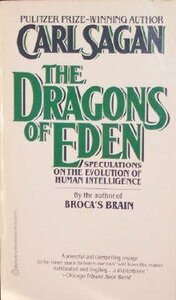Take a photo of a barcode or cover
I have heard of Carl Sagan and watched a part of his Cosmos tv series (very soothing, helped me fall asleep a few times when I was going through a rough patch), and I knew about his novel, [b:Contact|61666|Contact|Carl Sagan|https://i.gr-assets.com/images/S/compressed.photo.goodreads.com/books/1602082958l/61666._SY75_.jpg|2416056], but I did not try to find something more about him or his work.
That is until I had this book assigned to me in a course. It was quite a surprise.
It reads quite quickly. It forms a combination of speculative science and scientific myths, all starting from a scientific premise.
This is the exact read that someone who is into the fun part of science would like. It is more poetic rather than exhaustive. It is the YouTube type of fun science before there was YouTube-or the Internet for that matter because this was first published in 1977.
“And after we returned to the savannahs and abandoned the trees, did we long for those great graceful leaps and ecstatic moments of weightlessness in the shafts of sunlight of the forest roof? Is the startle reflex of human infants today to prevent falling from the treetops? Are our nighttime dreams of flying and our daytime passion for flight, as exemplified in the lives of Leonardo da Vinci or Konstantin Tsiolkovskii, nostalgic reminiscences of those days gone by in the branches of the high forest?”
It does not come with something new, or revolutionary, and mainly because at the time of me writing this (2022), it has passed almost half a century since the ideas of this book were propelled into the world (and as a consequence, instead of feeling revelatory, they felt more like the discovery of the source-place of other ideas that you have already seen be play through different SF and fantasy tv shows, movies and documentaries).

Carl Sagan was a legend, he managed to explain complicated subjects with such simplicity and passion that you can't help but be interested. The Demon-Haunted World (also by Sagan) is still my favourite non-fiction book of all time.
Dragons of Eden is a collection of recently learned facts by Sagan himself, and his speculations on said facts. The main problem I have is that a lot of the 'facts' are outdated. The triune brain is used as a foundation for a lot of his ideas, and to his credit they're intelligent, interesting and hopeful. But since the foundation is dilapidated at this point—an outdated, inaccurate notion to most neurologists of the modern day—a lot of it is unfortunately flawed.
Sagan does precede the book with warnings that he is not an expert on a lot of the subjects he talks about. It seems like he was very excited about a lot of this recently acquired information from the experts of the time, and couldn't help but write a book about it. I don't blame him.
Having said all that, there are chapters that have aged very well. When talking about ancient philosophy, or how humanity locks away animals that still have so much evolutionary potential, the book is brilliant. And overall it reads very, very well. The man knew how to write.
If anything, the shortcomings of Dragons of Eden make me think about the science books I've read from the last decade. How much foundational knowledge will be outdated? It also is a warning that I can't just read about one subject, then go through the rest of my life thinking the consensus won't change. This may be common sense to some, and of course I've thought about it before, but it's come to the forefront of my vision now, and cannot be ignored.
I still do think this book is worth reading, and of merit. Just take the speculations on the brain with a handful of salt.
With that said, I found the book worth the read. Sagan draws up a quick tour of human evolutionary lineage with a focus on our neocortical developments. He also always had a ready comparison to primates in order to more
fully showcase what makes us "human". As always, the line is thinner and more vague than many more orthodox religions would like to believe.
One major takeaway was the human ability, through the development of the neocortex, to have built-in "intelligence", I.e. analytical thinking, as compared to "instinct". Whereas instinctual information is programmed into tightly packed DNA (and is therefore limited in nature) and survives solely off adaptive selection, intelligence (or extragenetic info) resides in a larger brain capacity.. it is the ability to think on the fly and respond successfully to innumerable changing environments and situations.
Sagan introduces many other varying ideas and usually does a good job supporting them scientifically. All in all, if you ignore anything he says about aliens or computers, it's a good read.




